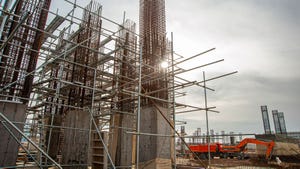Data Center Execs Focused on Regulation
Sixty nine percent of data center executives say they are "extremely or very concerned" about government regulation, with a huge surge in interest in carbon credits.
May 12, 2009

biggreen-earthday
The changes in Washington are being felt in the data center. The changed political and regulatory climate is clearly seen in survey data released today by Digital Realty Trust, the largest wholesale data center developer. The company's annual study of green data center trends in the U.S. found that 69 percent of data center executives said they were "extremely or very concerned" about government regulation, and a huge surge in interest in using carbon credits to offset greenhouse gas emissions."What dominated last year's study was the need for clearer standards and best practices for green data centers," said Jim Smith, CTO of Digital Realty Trust. "By contrast, what dominates this year's study is companies' concerns about potential government regulation and how that would impact data center operations."
The study, conducted by Campos Research, is based on a detailed survey of senior decision makers at large U.S. corporations who are responsible for their companies' data center and green IT strategies. Here are some of the key findings:
69 percent of survey participants said they were "extremely or very concerned" about government regulation.
81 percent of survey participants said that carbon credits are now part of their green IT strategy, compared to only 18 percent in 2008.
53 percent said that the industry now has a clear definition of what makes a data center green, compared to 82 percent in the 2008 survey who said that there was no clear definition.
73 percent of survey participants identified "energy efficiency" as the key aspect of a green data center.
While data centers may not be direct targets for regulation, they would feel the impact of broader regulations on corporate carbon emissions. The bama energy plan includes a "cap-and-trade" program to reduce greenhouse gas emissions 80 percent by 2050. A cap and trade system would set limits on corporate emissions, but allow companies to purchase or sell capacity in a carbon trading market.
The prospect of a cap-and-trade system is a clear driver in corporate interest in carbon credits, which would serve as the currency in a carbon trading market, in which companies that exceed their caps could buy credits to avoid penalties. Companies that use efficiency measures to remain below their cap could sell their excess capacity and generate revenue. A key concern for data center managers is that their facilities will become cap-busters.
"Concerns about potential regulations are driving companies to look closely at their data centers and accelerate the process of implementing green initiatives to increase energy efficiency," said Smith, who said concerns about government regulation are somewhat offset by good faith efforts by the Department of Energy and Environmental Protection Agency to work with the industry and groups like The Green Grid. "We believe that collaboration between the government and data center professionals is the most effective approach to addressing data center energy efficiency."
The findings are based on surveys of 100 IT decision makers at large corporations in North America with annual revenues of at least $1 billion or at least 5,000 employees. All participants are "CxO" level executives directly involved in the process of managing corporate data centers. The survey was conducted in March 2009.
About the Author
You May Also Like






